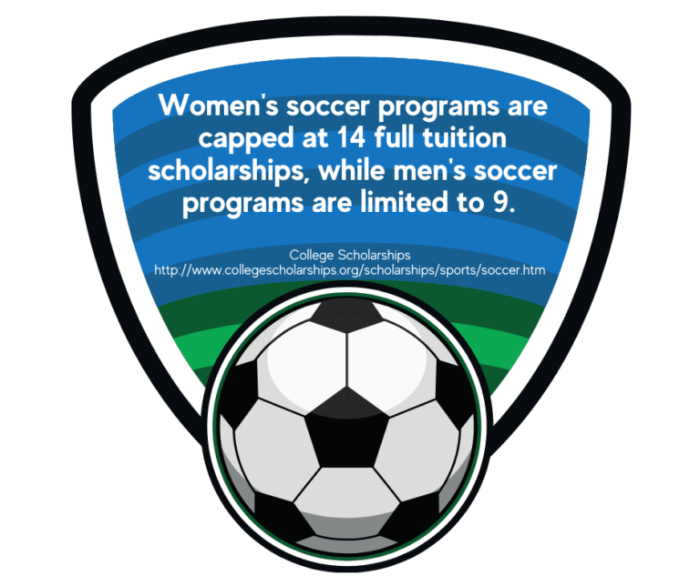Soccer scholarships offer a fantastic opportunity for aspiring athletes to pursue their passion while furthering their education. Securing funding can significantly alleviate the financial burden of college, allowing students to focus on their studies and athletic performance. This guide explores the various types of soccer scholarships available, strategies for finding them, and the application process itself, providing a comprehensive overview to help you navigate this exciting journey.
From understanding eligibility criteria and application requirements to mastering the art of crafting a compelling personal statement, we’ll cover all the essential aspects of securing a soccer scholarship. We’ll also delve into the importance of maintaining academic standing and balancing the demands of athletic training and academic pursuits. Ultimately, this resource aims to empower you with the knowledge and tools needed to increase your chances of success.
Types of Soccer Scholarships

Securing funding for a college education while pursuing a passion for soccer can be a significant challenge. Fortunately, several types of scholarships exist to help aspiring student-athletes achieve their goals. Understanding the different types and their respective eligibility requirements is crucial for successful application.
Athletic Scholarships, Soccer scholarships
Athletic scholarships are awarded based primarily on a student’s soccer skills and potential. These scholarships are often the most lucrative, covering a significant portion or even all of tuition, fees, room, and board. Eligibility typically involves demonstrating exceptional athletic ability through participation in high-level competitive soccer, such as club teams, state or national teams, or significant high school varsity achievements. The selection process often involves coaches evaluating game footage, attending tryouts, and assessing overall athletic performance and potential. The amount of funding awarded varies widely depending on the institution, the athlete’s skill level, and the overall scholarship budget.
Academic Scholarships
Academic scholarships recognize outstanding academic achievement and potential. These scholarships are merit-based and are awarded to students who demonstrate high academic performance through GPA, standardized test scores (SAT/ACT), and course selection. Eligibility criteria often include a minimum GPA, specific test score requirements, and sometimes a demonstrated commitment to academic excellence through participation in academic clubs or honors programs. The application process typically involves submitting transcripts, test scores, and potentially an essay highlighting academic achievements and future goals. The funding amount varies depending on the institution and the student’s academic profile.
Need-Based Scholarships
Need-based scholarships are awarded to students who demonstrate financial need. These scholarships are not directly tied to athletic or academic ability, but rather to the student’s and family’s financial circumstances. Eligibility is determined through a financial need analysis, often using the FAFSA (Free Application for Federal Student Aid) or a similar institutional process. The application process involves completing the necessary financial aid forms and providing documentation of income, assets, and expenses. The funding amount is determined by the institution’s financial aid office based on the demonstrated need.
| Scholarship Type | Eligibility Criteria | Application Process | Funding Amount |
|---|---|---|---|
| Athletic Scholarship | Exceptional soccer skills, demonstrated through high-level competition and coach evaluation. | Tryouts, game film submission, coach interviews. | Varies widely; can cover full or partial tuition, fees, room, and board. |
| Academic Scholarship | High GPA, strong standardized test scores (SAT/ACT), and sometimes demonstrated commitment to academics. | Transcript submission, test score submission, essay (often required). | Varies depending on institution and academic profile. |
| Need-Based Scholarship | Demonstrated financial need, assessed through financial aid applications (e.g., FAFSA). | Completion of financial aid forms and documentation of financial circumstances. | Varies depending on demonstrated need and institutional resources. |
Finding Soccer Scholarships

Securing funding for your soccer journey can significantly impact your ability to pursue your athletic and academic goals. Finding the right scholarship requires a strategic and diligent approach, utilizing various online resources and employing effective search techniques. This section will Artikel the best methods to locate and apply for soccer scholarships.
Finding suitable soccer scholarships requires leveraging a variety of online resources and employing a structured search strategy. Many organizations and platforms specialize in connecting student-athletes with scholarship opportunities.
Online Resources and Platforms for Discovering Soccer Scholarships
Several websites and platforms are dedicated to compiling and disseminating information about athletic scholarships. These resources often offer search functionalities allowing you to filter results based on sport, academic level, and other criteria. Effective use of these platforms is crucial for a successful scholarship search. Examples include dedicated scholarship search engines, college athletic department websites, and athletic scholarship databases. Many websites also offer tools to help refine your search, allowing you to focus on opportunities that specifically align with your academic and athletic profile. For example, a website might allow you to filter results based on your GPA, test scores, and playing position.
A Step-by-Step Guide to Searching for Soccer Scholarships
A structured approach is key to maximizing your chances of finding suitable scholarships. This step-by-step guide provides a practical framework for your search.
- Identify your eligibility criteria: Determine your academic standing (GPA, test scores), athletic achievements, and any specific requirements (e.g., position, playing level).
- Utilize online search engines: Employ targeted s such as “soccer scholarships,” “college soccer scholarships,” “high school soccer scholarships,” or even more specific terms like “NCAA Division I soccer scholarships.” Combine these s with other criteria, such as your location or preferred college type.
- Explore college athletic department websites: Directly visit the websites of colleges and universities you are interested in. Many athletic departments maintain dedicated scholarship pages outlining their financial aid opportunities.
- Use scholarship search engines: Dedicated scholarship search engines often have filters to refine results by sport, academic level, and other factors. Utilize these filters to narrow your search and focus on relevant opportunities.
- Network with coaches and athletic directors: Reach out to coaches at colleges you are interested in. They may have knowledge of scholarships not publicly advertised.
- Check with your high school or club coach: Your coaches may have connections or information about scholarships you may not have access to independently.
- Review scholarship deadlines: Pay close attention to application deadlines to ensure timely submission of all necessary materials.
Tips and Strategies for Maximizing Scholarship Opportunities
Beyond the structured search, several strategies can significantly increase your chances of success. These strategies involve proactive engagement and careful attention to detail in your applications.
- Maintain a strong academic record: A high GPA and strong standardized test scores are crucial for many scholarships.
- Highlight athletic achievements: Showcase your soccer skills and accomplishments through game statistics, awards, and letters of recommendation from coaches.
- Craft compelling application materials: Write strong essays that demonstrate your passion for soccer and your academic goals. Ensure your application materials are free of errors and professionally presented.
- Apply to multiple scholarships: Don’t put all your eggs in one basket. Apply to a variety of scholarships to increase your chances of securing funding.
- Start early: Begin your scholarship search well in advance of your intended college enrollment date.
- Seek mentorship: Connect with current or former student-athletes who have successfully secured soccer scholarships. Their insights and experiences can be invaluable.
Reputable Organizations Offering Soccer Scholarships
Several organizations are dedicated to providing financial aid to student-athletes. These organizations often have specific eligibility criteria and application processes. It’s essential to thoroughly research each organization to understand their requirements and deadlines.
- The National Collegiate Athletic Association (NCAA): The NCAA offers a range of scholarships for student-athletes at various levels of competition.
- National Soccer Coaches Association of America (NSCAA): The NSCAA, while not a direct scholarship provider, offers resources and connections to assist in finding scholarship opportunities.
- Individual College Athletic Departments: Many colleges and universities have their own scholarship programs specifically for soccer players. Check their websites for details.
- State and Local Athletic Associations: Some state and local athletic associations offer scholarships to student-athletes within their jurisdictions.
- Private Organizations and Foundations: Numerous private organizations and foundations offer scholarships based on various criteria, including athletic achievement.
The Application Process

Securing a soccer scholarship involves a rigorous application process that demands meticulous preparation and attention to detail. Success hinges on presenting a compelling case that showcases both athletic prowess and academic excellence. A well-structured application, complete with all necessary components, significantly increases your chances of receiving an award.
The common components of a soccer scholarship application are designed to provide a holistic view of the applicant. Colleges and universities seek individuals who excel not only on the field but also in the classroom. A strong application demonstrates commitment, dedication, and the potential for success in both academic and athletic pursuits.
Application Components
A typical application package includes several key elements. Academic transcripts provide a record of your academic performance, demonstrating your commitment to education and your ability to manage a demanding academic workload alongside athletic training. Athletic achievements, documented through game statistics, awards, and coach recommendations, highlight your skills and contributions to your team. Letters of recommendation, ideally from coaches, teachers, or counselors who can speak to your character and abilities, offer external validation of your qualifications. Finally, a well-crafted personal statement allows you to articulate your aspirations and demonstrate your suitability for the scholarship.
The Importance of a Strong Personal Statement
The personal statement is your opportunity to connect with the scholarship committee on a personal level. It’s more than just a summary of your accomplishments; it’s a chance to showcase your personality, values, and motivations. A compelling personal statement should clearly articulate your goals, explain your passion for soccer, and highlight experiences that have shaped your character and aspirations. For example, a statement might detail overcoming a significant injury, demonstrating resilience and determination. Or it could focus on a specific moment of leadership on the field, illustrating teamwork and strategic thinking. Ultimately, your personal statement should demonstrate why you are a deserving candidate for the scholarship.
Showcasing Athletic Skills and Achievements
Effectively showcasing your athletic skills and achievements requires a strategic approach. Begin by compiling a comprehensive record of your accomplishments, including statistics from games and tournaments, awards received, and any significant contributions to your team’s success. This information should be presented clearly and concisely, perhaps in a table format. For example, a table could detail goals scored per season, assists, and any significant awards received. Beyond statistics, emphasize qualities like leadership, teamwork, and sportsmanship. Include details about your training regimen and any specific skills you’ve developed. Quantifiable achievements are always impactful; for instance, “increased team scoring average by 15% over the last two seasons” is more effective than simply stating “improved team performance.”
Sample Application Checklist
A well-organized checklist is essential to ensure a complete and timely submission. This checklist should be tailored to the specific requirements of each scholarship application, but generally includes:
- Completed application form
- Official academic transcripts
- Athletic resume or record
- Letters of recommendation (at least two)
- Personal statement/essay
- Copies of any awards or certificates
- Headshot photograph
- Proof of acceptance or application to the institution
Successfully obtaining a soccer scholarship requires dedication, strategic planning, and a well-crafted application. By understanding the different types of scholarships available, effectively researching opportunities, and presenting yourself compellingly, you can significantly increase your chances of securing funding for your athletic and academic pursuits. Remember, perseverance and a strong commitment to both academics and athletics are key ingredients in this rewarding journey. Good luck!
FAQ Corner
What GPA is typically required for soccer scholarships?
GPA requirements vary widely depending on the institution and the level of competition. Generally, a high GPA (above 3.0) is beneficial, but athletic achievements often weigh heavily in the selection process.
Can I receive a soccer scholarship if I’m not a starting player?
While starting players often have an advantage, contributions to the team, demonstrated skills, and potential are also considered. A strong application highlighting your contributions and potential can still lead to a scholarship.
What if I don’t receive a full scholarship?
Many scholarships are partial awards. You can often combine partial scholarships from different sources or supplement them with other financial aid options to cover your college expenses.
When should I start applying for soccer scholarships?
Ideally, begin researching and preparing your applications well in advance, ideally during your junior year of high school. Many scholarship deadlines fall early in the senior year.
Securing a soccer scholarship can be a game-changer for aspiring athletes, opening doors to top-tier collegiate programs. However, financial aid options extend beyond athletic scholarships; for instance, you might also explore the pmrf scholarship as a supplementary funding source. This could significantly ease the financial burden, allowing you to focus entirely on your soccer career and academic pursuits.